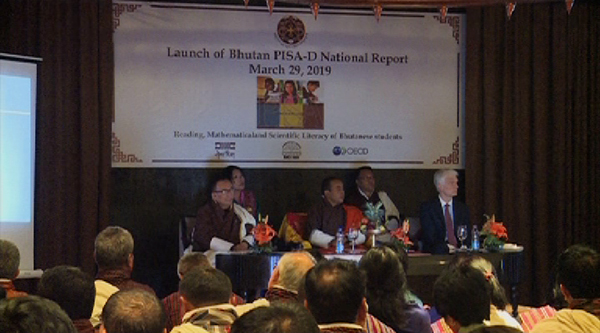 Bhutanese students did not perform better in skills that require application, analysis, creativity and problem solving, as per the findings of Bhutan’s PISA-D National Report launched on March 29.
Bhutanese students did not perform better in skills that require application, analysis, creativity and problem solving, as per the findings of Bhutan’s PISA-D National Report launched on March 29.
Programme for International Student Assessment for development (PISA-D) is a program carried out by the Organization for Economic Co-operation and Development for middle and low-income countries on 15-year-old students. It assesses the quality of learning outcomes in subjects such as science, mathematics and reading skills.
The findings highlighted that on the three subjects they were tested, students performed slightly better in reading and science compared to mathematics.
Girls outperformed boys in reading, and in mathematics, boys performed better while both boys and girls performed equally in science.
The findings also demonstrated that Bhutanese students have relatively broader knowledge and understanding compared to other eight PISA-D countries such as Cambodia, Ecuador, Guatemala, Honduras, Panama, Paraguay, Senegal and Zambia.
“The students are doing particularly well on tasks where they can reproduce what they know. The students are not doing so well on tasks where they need to extrapolate from what they know, apply their knowledge creatively in an unfamiliar situation,” Andreas Schleicher, the Director for Education and Skills, OECD, said.
“But those tasks are becoming increasingly important in the world. The world no longer rewards us just for what we know as Google knows everything. But the world rewards us for what we can do from what we know. So I think this is an area where Bhutan can still work.”
PISA-D assesses 15-year-olds because in most countries including Bhutan these students are near the end of basic education. And it assesses student’s literacy in reading, mathematics and science as they are the foundations of education.
The report recommends the relevant sectors to prioritise on the depth rather than the breadth of learning to avoid superficial learning, incomplete understanding of core concepts and limited ability to transfer and apply knowledge to unfamiliar contexts among others.
“What PISA can tell Bhutan is what everybody else has been doing. When I look at the work organizations of teachers, teachers teach a lot but they spend less time with individual students, they spend less time with students’ parents, they spend less time with each other than in many hard performing education systems,” Andreas Schleicher said.
The education ministry signed the Memorandum of Understanding (MoU) for PISA-D participation in 2017 during the 18th National Education Conference to check the state of education in the country against international standards.
Over 2,000 students from grade seven to twelve covering 53 schools participated in two hours test for PISA-D in 2017.
The findings and recommendations from the report will be an important milestone for the education system to prepare students for life beyond classrooms.












